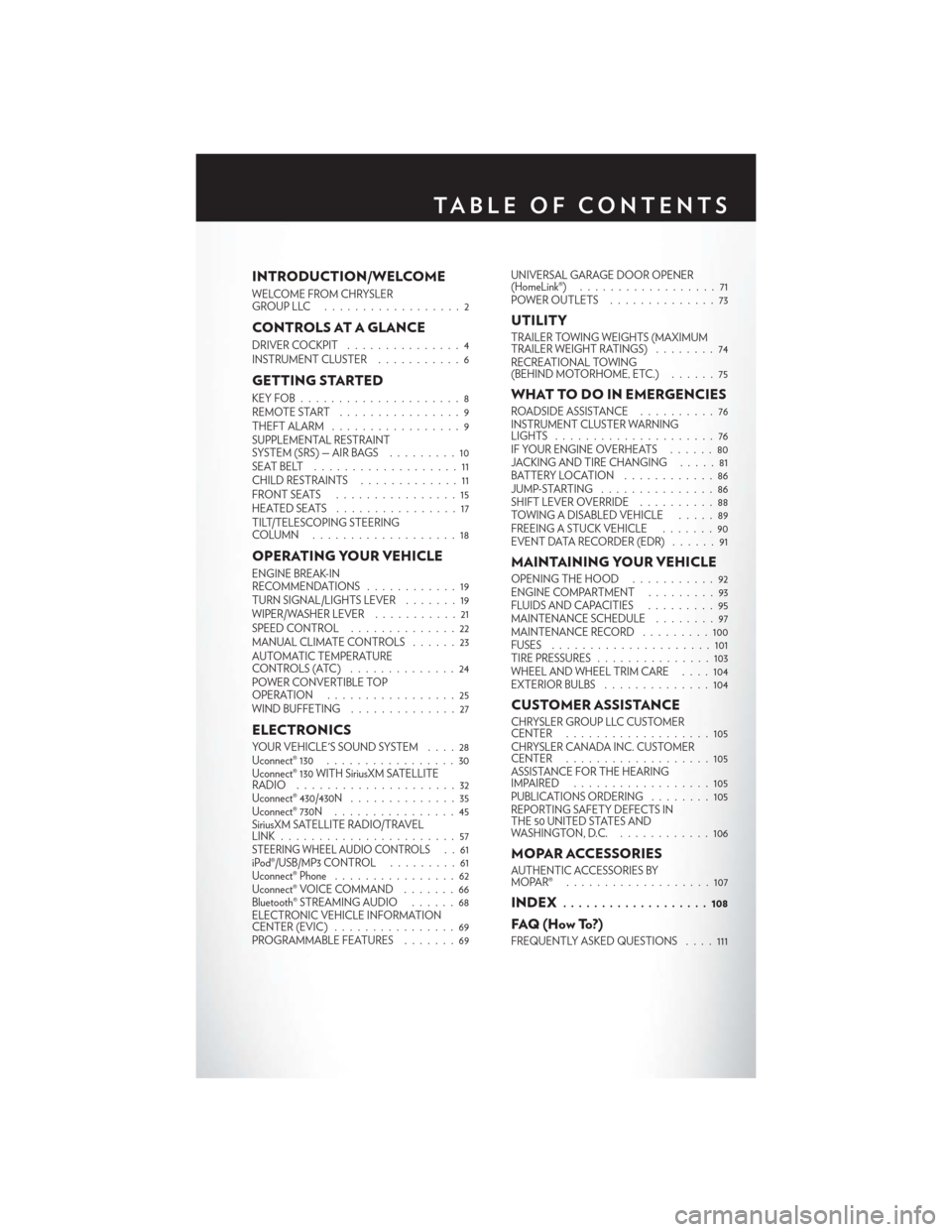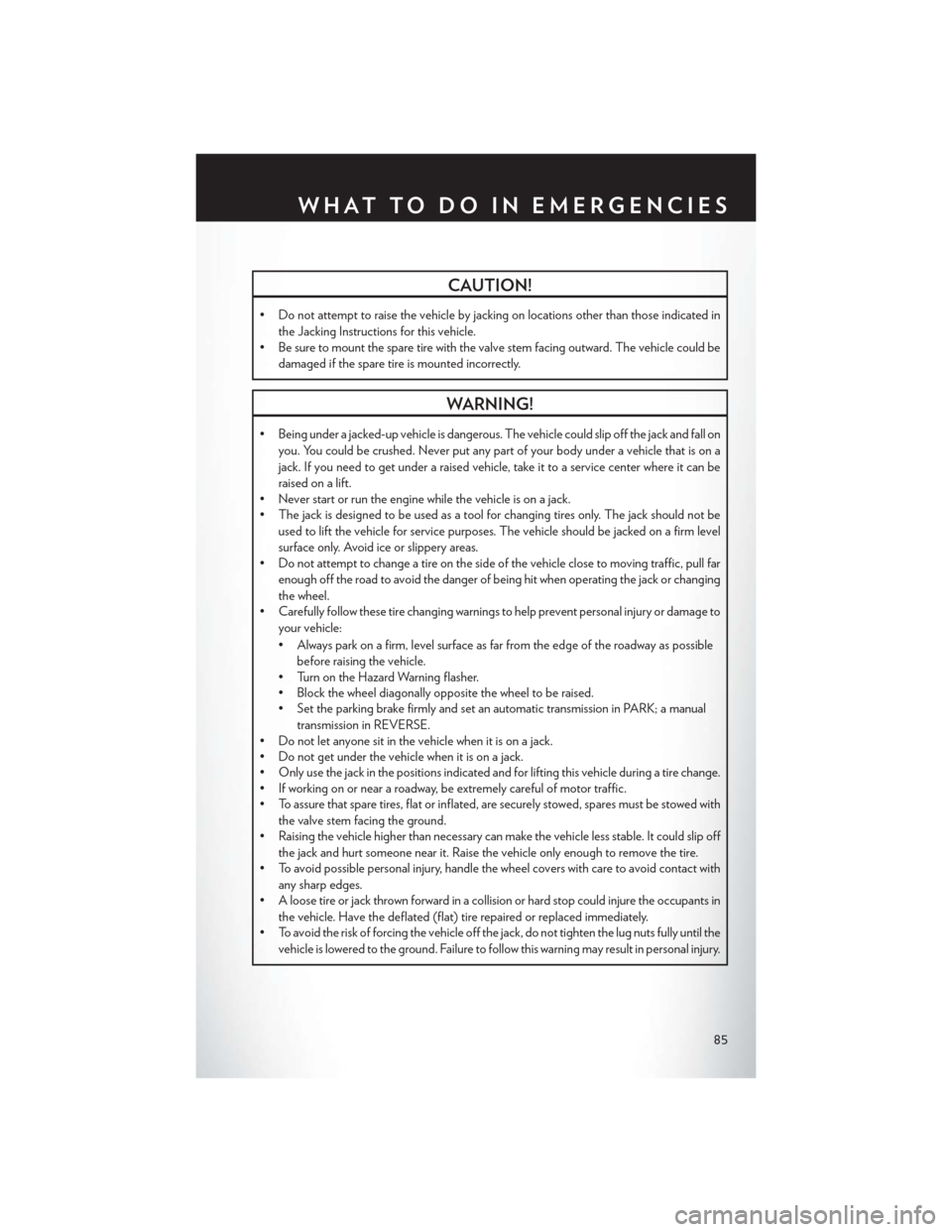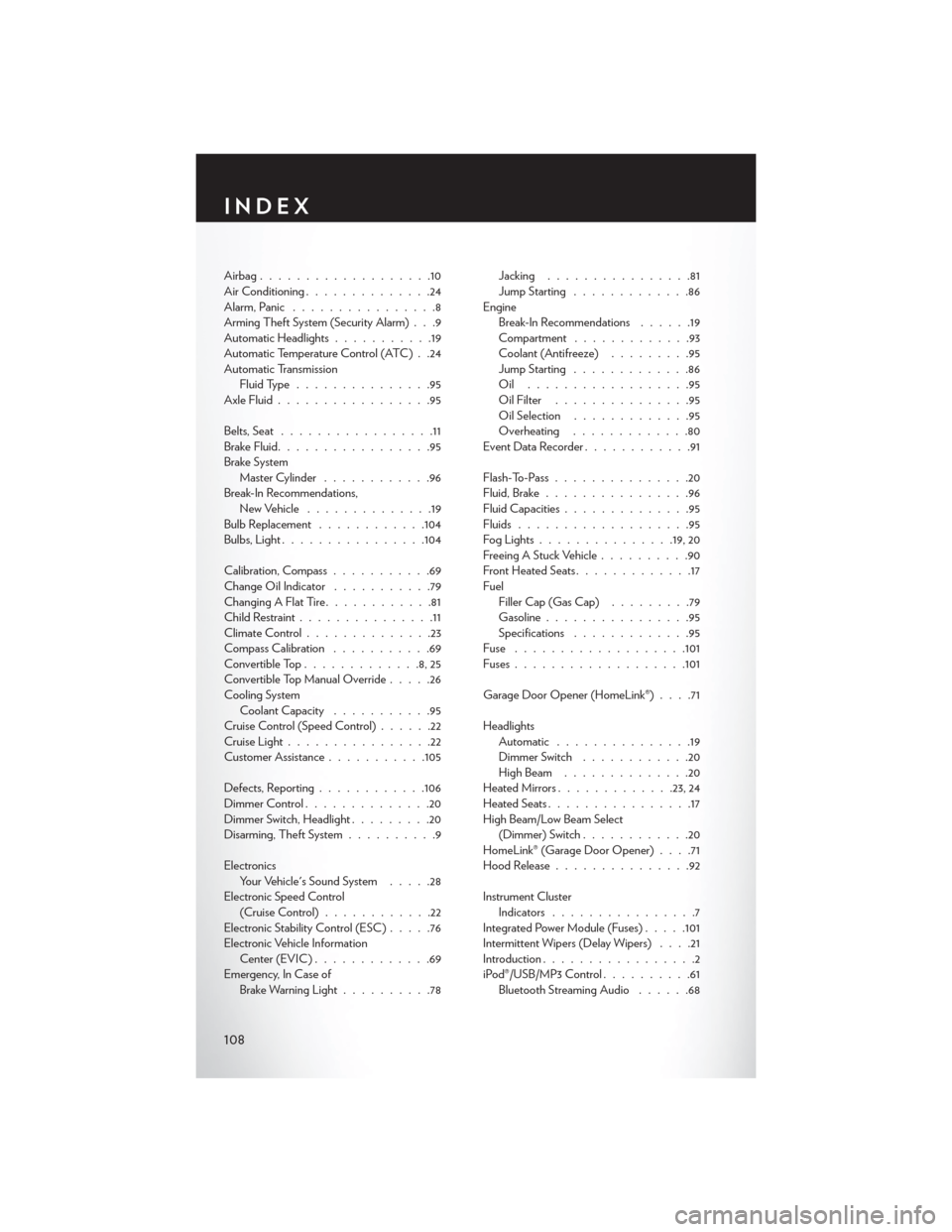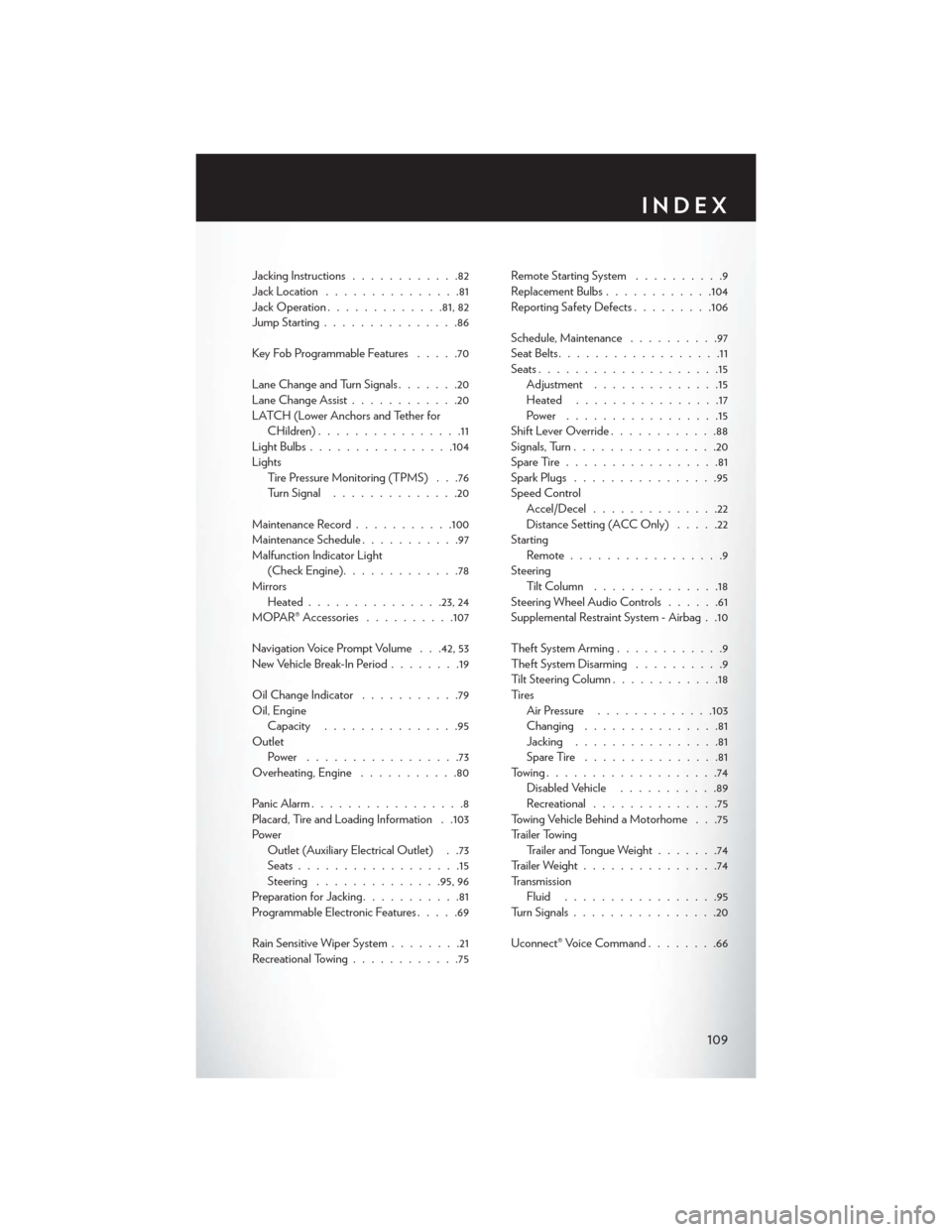jacking CHRYSLER 200 CONVERTIBLE 2013 1.G User Guide
[x] Cancel search | Manufacturer: CHRYSLER, Model Year: 2013, Model line: 200 CONVERTIBLE, Model: CHRYSLER 200 CONVERTIBLE 2013 1.GPages: 116, PDF Size: 3.04 MB
Page 3 of 116

INTRODUCTION/WELCOME
WELCOME FROM CHRYSLER
GROUPLLC ..................2
CONTROLS AT A GLANCE
DRIVER COCKPIT...............4
INSTRUMENT CLUSTER ...........6
GETTING STARTED
KEYFOB.....................8
REMOTE START................9
THEFT ALARM .................9
SUPPLEMENTAL RESTRAINT
SYSTEM (SRS) — AIR BAGS .........10
SEATBELT ...................11
CHILD RESTRAINTS .............11
FRONTSEATS ................15
HEATEDSEATS ................17
TILT/TELESCOPING STEERING
COLUMN ...................18
OPERATING YOUR VEHICLE
ENGINE BREAK-IN
RECOMMENDATIONS ............19
TURN SIGNAL/LIGHTS LEVER .......19
WIPER/WASHER LEVER ...........21
SPEED CONTROL ..............22
MANUAL CLIMATE CONTROLS ......23
AUTOMATIC TEMPERATURE
CONTROLS (ATC) ..............24
POWER CONVERTIBLE TOP
OPERATION .................25
WIND BUFFETING . . ............27
ELECTRONICS
YOUR VEHICLE'S SOUND SYSTEM ....28
Uconnect® 130 .................30
Uconnect® 130 WITH SiriusXM SATELLITE
RADIO .....................32
Uconnect® 430/430N ..............35
Uconnect® 730N . . ..............45
SiriusXM SATELLITE RADIO/TRAVEL
LINK .......................57
STEERING WHEEL AUDIO CONTROLS..61
iPod®/USB/MP3 CONTROL .........61
Uconnect® Phone ................62
Uconnect® VOICE COMMAND .......66
Bluetooth® STREAMING AUDIO ......68
ELECTRONIC VEHICLE INFORMATION
CENTER (EVIC) ................69
PROGRAMMABLE FEATURES .......69UNIVERSAL GARAGE DOOR OPENER
(HomeLink®)
..................71
POWER OUTLETS ..............73
UTILITY
TRAILER TOWING WEIGHTS (MAXIMUM
TRAILER WEIGHT RATINGS) ........74
RECREATIONAL TOWING
(BEHIND MOTORHOME, ETC.) ......75
WHAT TO DO IN EMERGENCIES
ROADSIDE ASSISTANCE..........76
INSTRUMENT CLUSTER WARNING
LIGHTS .....................76
IF YOUR ENGINE OVERHEATS ......80
JACKING AND TIRE CHANGING . . . . . 81
BATTERY LOCATION ............86
JUMP-STARTING ...............86
SHIFT LEVER OVERRIDE ..........88
TOWING A DISABLED VEHICLE .....89
FREEING A STUCK VEHICLE .......90
EVENT DATA RECORDER (EDR) . . ....91
MAINTAINING YOUR VEHICLE
OPENING THE HOOD . . .........92
ENGINE COMPARTMENT .........93
FLUIDSANDCAPACITIES .........95
MAINTENANCE SCHEDULE ........97
MAINTENANCE RECORD . ........100
FUSES .....................101
TIRE PRESSURES ...............103
WHEEL AND WHEEL TRIM CARE ....104
EXTERIOR BULBS ..............104
CUSTOMER ASSISTANCE
CHRYSLER GROUP LLC CUSTOMER
CENTER...................105
CHRYSLER CANADA INC. CUSTOMER
CENTER ...................105
ASSISTANCE FOR THE HEARING
IMPAIRED ..................105
PUBLICATIONS ORDERING ........105
REPORTING SAFETY DEFECTS IN
THE 50 UNITED STATES AND
WASHINGTON, D.C. ............106
MOPAR ACCESSORIES
AUTHENTIC ACCESSORIES BY
MOPAR® ...................107
INDEX................... 108
FAQ(HowTo?)
FREQUENTLY ASKED QUESTIONS ....111
TABLE OF CONTENTS
Page 83 of 116

JACKING AND TIRE CHANGING
Jack Location
• The jack and jack-handle are stowed under the load floor in the trunk.
Spare Tire Stowage
• The compact spare tire is stowed under the rear load floor in the trunk.
Spare Tire Removal
• Lift up the load floor cover and remove the hold down.
Preparations For Jacking
1. Park the vehicle on a firm, level surface.Avoid ice or slippery areas.
2. Turn on the Hazard Warning flashers.
3. Set the parking brake.
4. Place the shift lever into PARK (automatic transmission) or REVERSE (manual trans-
mission).
5. Turn OFF the ignition.
• Block both the front and rear of the wheel diagonally opposite the jacking position. For
example, if changing the right front tire,
block the left rear wheel.
NOTE:
Passengers should not remain in the vehicle
while the vehicle is being jacked.
WHAT TO DO IN EMERGENCIES
81
Page 84 of 116

Jacking Instructions
1. Remove the scissors jack and lug wrenchfrom the spare wheel as an assembly. Turn
the jack screw to the left to loosen the lug
wrench, and remove the wrench from the
jack assembly.
NOTE:
The jack handle attaches to the side of the jack with two attachment points. When the jack is
partially expanded, the tension between the two attachment points holds the jack handle in place.
2. Loosen, but do not remove, the wheel nuts by turning them to the left one turn while
the wheel is still on the ground.
WHAT TO DO IN EMERGENCIES
82
Page 85 of 116

3. There is a front and rear jacking location on each side of the vehicle.
4. Turn the jack screw to the left until the jackcan be placed under the jacking location.
Once the jack is positioned, turn the jack
screw to the right until the jack head is prop-
erly engaged with the lift area closest to the
wheel to be changed. Do not raise the ve-
hicle until you are sure the jack is securely
engaged.
5. Raise the vehicle by turning the jack screw to the right, using the swivel wrench. Raise
the vehicle only until the tire just clears the
surface and enough clearance is obtained to
install the spare tire. Minimum tire lift pro-
vides maximum stability.
6. Remove the wheel nuts, and pull the wheel and wheel covers (where applicable) off the hub. Install the spare wheel and wheel nuts with the cone shaped end of the nuts toward the wheel.
Lightly tighten the nuts.
7. Lower the vehicle by turning the jack screw to the left.
8. Finish tightening the nuts. Push down on the wrench while at the end of the handle for
increased leverage. Tighten the lug nuts in a
star pattern until each nut has been tight-
ened twice. The correct wheel nut torque is
100 ft lbs (135 N·m). If you doubt that you
have tightened the nuts correctly, have
them checked with a torque wrench by your
authorized dealer or at a service station.
9. Remove the wheel blocks and lower the jack until it is free. Reassemble the lug wrench to the jack assembly and stow it in the spare tire area. Secure the assembly using the means provided.
10. Place the deflated (flat) tire in the cargo area and have the tire repaired or replaced as soon
as possible.
11. Check the tire pressure as soon as possible. Correct the tire pressure as required.
WHAT TO DO IN EMERGENCIES
83
Page 87 of 116

CAUTION!
• Do not attempt to raise the vehicle by jacking on locations other than those indicated inthe Jacking Instructions for this vehicle.
• Be sure to mount the spare tire with the valve stem facing outward. The vehicle could be
damaged if the spare tire is mounted incorrectly.
WARNING!
• Being under a jacked-up vehicle is dangerous. The vehicle could slip off the jack and fall onyou. You could be crushed. Never put any part of your body under a vehicle that is on a
jack. If you need to get under a raised vehicle, take it to a service center where it can be
raised on a lift.
• Never start or run the engine while the vehicle is on a jack.
• The jack is designed to be used as a tool for changing tires only. The jack should not be
used to lift the vehicle for service purposes. The vehicle should be jacked on a firm level
surface only. Avoid ice or slippery areas.
• Do not attempt to change a tire on the side of the vehicle close to moving traffic, pull far
enough off the road to avoid the danger of being hit when operating the jack or changing
the wheel.
• Carefully follow these tire changing warnings to help prevent personal injury or damage to
your vehicle:
• Always park on a firm, level surface as far from the edge of the roadway as possiblebefore raising the vehicle.
• Turn on the Hazard Warning flasher.
• Block the wheel diagonally opposite the wheel to be raised.
• Set the parking brake firmly and set an automatic transmission in PARK; a manual
transmission in REVERSE.
• Do not let anyone sit in the vehicle when it is on a jack.
• Do not get under the vehicle when it is on a jack.
• Only use the jack in the positions indicated and for lifting this vehicle during a tire change.
• If working on or near a roadway, be extremely careful of motor traffic.
• To assure that spare tires, flat or inflated, are securely stowed, spares must be stowed with
the valve stem facing the ground.
• Raising the vehicle higher than necessary can make the vehicle less stable. It could slip off
the jack and hurt someone near it. Raise the vehicle only enough to remove the tire.
• To avoid possible personal injury, handle the wheel covers with care to avoid contact with
any sharp edges.
• A loose tire or jack thrown forward in a collision or hard stop could injure the occupants in
the vehicle. Have the deflated (flat) tire repaired or replaced immediately.
• To avoid the risk of forcing the vehicle off the jack, do not tighten the lug nuts fully until the
vehicle is lowered to the ground. Failure to follow this warning may result in personal injury.
WHAT TO DO IN EMERGENCIES
85
Page 110 of 116

Airbag...................10
Air Conditioning..............24
Alarm, Panic ................8
Arming Theft System (Security Alarm) . . .9
Automatic Headlights ...........19
Automatic Temperature Control (ATC) . .24
Automatic Transmission Fluid Type ...............95
Axle Fluid .................95
Belts, Seat .................11
Brake Fluid .................95
Brake System Master Cylinder ............96
Break-In Recommendations, New Vehicle ..............19
Bulb Replacement ............104
Bulbs,Light................104
Calibration, Compass ...........69
Change Oil Indicator ...........79
Changing A Flat Tire ............81
Child Restraint ...............11
Climate Control ..............23
Compass Calibration ...........69
Convertible Top .............8,25
Convertible Top Manual Override .....26
Cooling System Coolant Capacity ...........95
Cruise Control (Speed Control) ......22
Cruise Light ................22
Customer Assistance ...........105
Defects, Reporting ............106
Dimmer Control ..............20
Dimmer Switch, Headlight .........20
Disarming, Theft System ..........9
Electronics Your Vehicle's Sound System .....28
Electronic Speed Control (Cruise Control) ............22
Electronic Stability Control (ESC) .....76
Electronic Vehicle Information Center (EVIC) .............69
Emergency, In Case of Brake Warning Light ..........78 Jacking
................81
Jump Starting .............86
Engine Break-In Recommendations ......19
Compartment .............93
Coolant (Antifreeze) .........95
Jump Starting .............86
Oil ..................95
Oil Filter ...............95
Oil Selection .............95
Overheating .............80
EventDataRecorder............91
Flash-To-Pass ...............20
Fluid, Brake ................96
Fluid Capacities ..............95
Fluids ...................95
F
ogLights...............19, 20
Freeing A Stuck Vehicle ..........90
Front Heated Seats .............17
Fuel Filler Cap (Gas Cap) .........79
Gasoline ................95
Specifications .............95
Fuse ...................101
Fuses .................. .101
Garage Door Opener (HomeLink®) ....71
Headlights Automatic ...............19
Dimmer Switch ............20
HighBeam ..............20
Heated Mirrors ............ .23, 24
Heated Seats ................17
High Beam/Low Beam Select (Dimmer) Switch ............20
HomeLink® (Garage Door Opener) ....71
Hood Release ...............92
Instrument Cluster Indicators ................7
Integrated Power Module (Fuses) .....101
Intermittent Wipers (Delay Wipers) ....21
Introduction .................2
iPod®/USB/MP3 Control ..........61
Bluetooth Streaming Audio ......68
INDEX
108
Page 111 of 116

Jacking Instructions............82
Jack Location ...............81
Jack Operation .............81, 82
Jump Starting ...............86
Key Fob Programmable Features .....70
Lane Change and Turn Signals .......20
Lane Change Assist ............20
LATCH (Lower Anchors and Tether for CHildren) ................11
LightBulbs................104
Lights Tire Pressure Monitoring (TPMS) . . .76
Turn Signal ..............20
Maintenance Record ...........100
Maintenance Schedule ...........97
Malfunction Indicator Light (Check Engine).............78
Mirrors Heated .............. .23, 24
MOPAR® Accessories ..........107
Navigation Voice Prompt Volume . . .42, 53
New Vehicle Break-In Period ........19
Oil Change Indicator ...........79
Oil, Engine Capacity ...............95
Outlet Power .................73
Overheating, Engine ...........80
Panic Alarm .................8
Placard, Tire and Loading Information . .103
Power Outlet (Auxiliary Electrical Outlet) . .73
Seats ..................15
Steering ............. .95, 96
Preparation for Jacking ...........81
Programmable Electronic Features .....69
Rain Sensitive Wiper System ........21
Recreational Towing ............75 Remote Starting System
..........9
Replacement Bulbs ............104
Reporting Safety Defects .........106
Schedule, Maintenance ..........97
Seat Belts ..................11
Seats ....................15
Adjustment ..............15
Heated ................17
Power .................15
Shift Lever Override ............88
Signals, Turn ................20
SpareTire.................81
Spark Plugs ................95
Speed Control Accel/Decel ..............22
Distance Setting (ACC Only) .....22
Starting Remote.................9
Steering TiltColumn ..............18
Steering Wheel Audio Controls ......61
Supplemental Restraint System - Airbag . .10
Theft System Arming ............
9
Theft System Disarming ..........9
Tilt Steering Column ............18
Ti re s Air Pressure .............103
Changing ...............81
Jacking ................81
SpareTire ...............81
Towing...................74 Disabled Vehicle ...........89
Recreational ..............75
Towing Vehicle Behind a Motorhome . . .75
Trailer Towing Trailer and Tongue Weight .......74
Trailer Weight ...............74
Transmission Fluid .................95
Turn Signals ................20
Uconnect® Voice Command ........66
INDEX
109